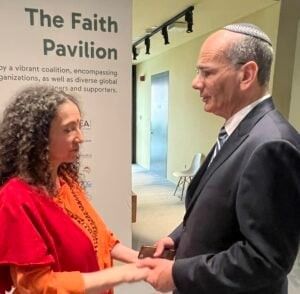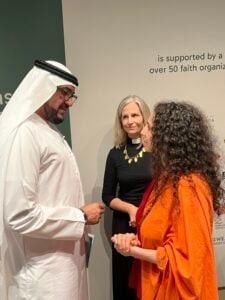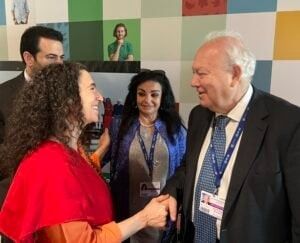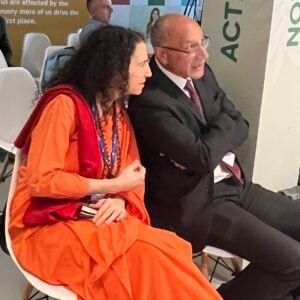At the COP28 this week, Sadhvi Bhagawati Saraswati from Parmarth Niketan in Rishikesh participated in two, panel discussions focusing on faith’s role in environmental conservation.
This year’s COP Climate Summit marked the first-ever establishment of an official “Faith Pavilion” within the high-security blue-zone area, highlighting the pivotal role of faith leaders and communities in addressing climate change.
Unfortunately, Pope Francis could not inaugurate the Pavilion on December 3 due to health concerns, altering the planned schedule.
Saraswati who serves as Secretary-General of Global Interfaith WASH Alliance, President of Divine Shakti Foundation, and International Director of Parmarth Niketan, spoke at two distinct high-level events held at the Faith Pavilion.
The first session, organised by the American Jewish Committee, centered on “Practical Faith Leadership in Addressing Climate Change.”
 The event moderated by AJC’s Rabbi Noam Marans, Director of Interfaith Relations for the American Jewish Committee, featured Sadhvi Bhagawati Saraswati along with His Excellency Sheikh Al Mahfoudh Bin Bayyah, Secretary General of the Abu Dhabi Forum for Peace, and Reverend Christine Trainor from St. Andrew’s Church, Abu Dhabi, a press release by Saraswati said.
The event moderated by AJC’s Rabbi Noam Marans, Director of Interfaith Relations for the American Jewish Committee, featured Sadhvi Bhagawati Saraswati along with His Excellency Sheikh Al Mahfoudh Bin Bayyah, Secretary General of the Abu Dhabi Forum for Peace, and Reverend Christine Trainor from St. Andrew’s Church, Abu Dhabi, a press release by Saraswati said.

Saraswati spoke about the Hindu principles of Vasudhaiv Kutumbakam, the world as one family of Vasudhu, the Goddess of Mother Earth, and the teachings from the Upanishads, emphasising the unity of the world as one family and the divine presence in everything, and the sanctity of creation.
She stressed the significance of offering the five elements to the Divine in Hindu worship ceremonies, symbolising the sacredness and holiness of creation as it is dedicated to the Creator.
Saraswati also highlighted the commendable efforts of the Global Interfaith WASH Alliance, chaired by HH Pujya Swami Chidanand Saraswati, in water, sanitation, hygiene, and environmental protection.
The second panel, hosted by Religions for Peace International, the world’s largest premier interreligious organisation explored the theme: “Women of Faith for Rights & Resilience: Taking Stock of Progress and Lessons Learned from Decades of Climate Action.” It focused on the intersection of women, faith, and climate.
The panel was led by Deepika Singh, Religions for Peace’s Associate Secretary-General and Director of Programmes. Additional panelists included Dr Ibrahim Salama, Chief of the Human Rights Office at OHCHR, along with Mihir Mathur, Founder of DESTA Research LLP, and Pradnya Mathur, Consultant at Global Peace Initiative of Women (GPIW).
Saraswati highlighted the hardships faced by Himalayan women due to climate change, advocating for access to resources. She also stressed the significance of ensuring women and girls have access to water, seeds, education, and training.
She highlighted the initiatives undertaken by the Global Interfaith WASH Alliance and Divine Shakti Foundation, Parmarth Niketan, aimed at providing education and training specifically for girls in the Himalayan region.
Additionally, Saraswati emphasised the significance of tree planting and discussed the efforts led by HH Pujya Swami Chidanand Saraswati in gifting fruit trees to girls and women.
This initiative serves the dual purpose of providing them with a source of income especially when floods strike and take the lives of the men and boys who are working on the Char Dham yatra tourist route, leaving entire villages of only women and girls without any way to support themselves. The initiative also contributes to the reforestation of the Himalayas.

During COP28, Saraswati also met H.E. Miguel Moratinos, the High Representative of the United Nations Alliance of Civilizations, Iyad Abu Moghli, the Director of the United Nations Environment Programme Faith for the Earth, Chief Rabbi David Rosen, and various other prominent leaders.

